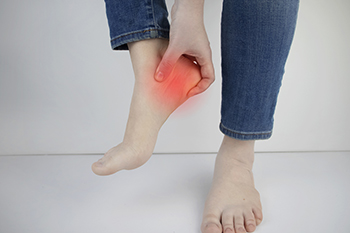
Plantar fasciitis is the most commonly reported cause of heel discomfort. This condition targets the plantar fascia, which is a broad ligament that extends from the heel to toes. When it is overused, such as from running for long periods of time, tiny tears can result. This leads to irritation and inflammation and ultimately causes heel pain. The discomfort is more intense in the early morning, but can gradually subside as the day progresses due to the warming and stretching effects on the fascia. Problems with the foot's structure, such as flat feet or high arches, can contribute to plantar fasciitis, but its most common cause is repetitive use. It also can result from prolonged standing or wearing unsupportive footwear. Performing certain stretching exercises, refraining from walking barefoot, wearing appropriate footwear, and periodically resting the feet can help to alleviate the pain. An effective simple morning exercise involves flexing the foot ten times before getting out of bed, or after sitting for an extended period of time. In cases of persistent pain, custom orthotics for cushioning and night splints may be introduced. In more extreme scenarios, corticosteroid injections can offer pain relief. For help in managing the pain of plantar fasciitis, it is suggested that you make an appointment with a podiatrist.
Plantar fasciitis is a common foot condition that is often caused by a strain injury. If you are experiencing heel pain or symptoms of plantar fasciitis, contact Anas Khoury, DPM from North Eastern Foot & Ankle Specialists. Our doctor can provide the care you need to keep you pain-free and on your feet.
What Is Plantar Fasciitis?
Plantar fasciitis is one of the most common causes of heel pain. The plantar fascia is a ligament that connects your heel to the front of your foot. When this ligament becomes inflamed, plantar fasciitis is the result. If you have plantar fasciitis you will have a stabbing pain that usually occurs with your first steps in the morning. As the day progresses and you walk around more, this pain will start to disappear, but it will return after long periods of standing or sitting.
What Causes Plantar Fasciitis?
- Excessive running
- Having high arches in your feet
- Other foot issues such as flat feet
- Pregnancy (due to the sudden weight gain)
- Being on your feet very often
There are some risk factors that may make you more likely to develop plantar fasciitis compared to others. The condition most commonly affects adults between the ages of 40 and 60. It also tends to affect people who are obese because the extra pounds result in extra stress being placed on the plantar fascia.
Prevention
- Take good care of your feet – Wear shoes that have good arch support and heel cushioning.
- Maintain a healthy weight
- If you are a runner, alternate running with other sports that won’t cause heel pain
There are a variety of treatment options available for plantar fasciitis along with the pain that accompanies it. Additionally, physical therapy is a very important component in the treatment process. It is important that you meet with your podiatrist to determine which treatment option is best for you.
If you have any questions, please feel free to contact our office located in Passaic, NJ . We offer the newest diagnostic and treatment technologies for all your foot care needs.
